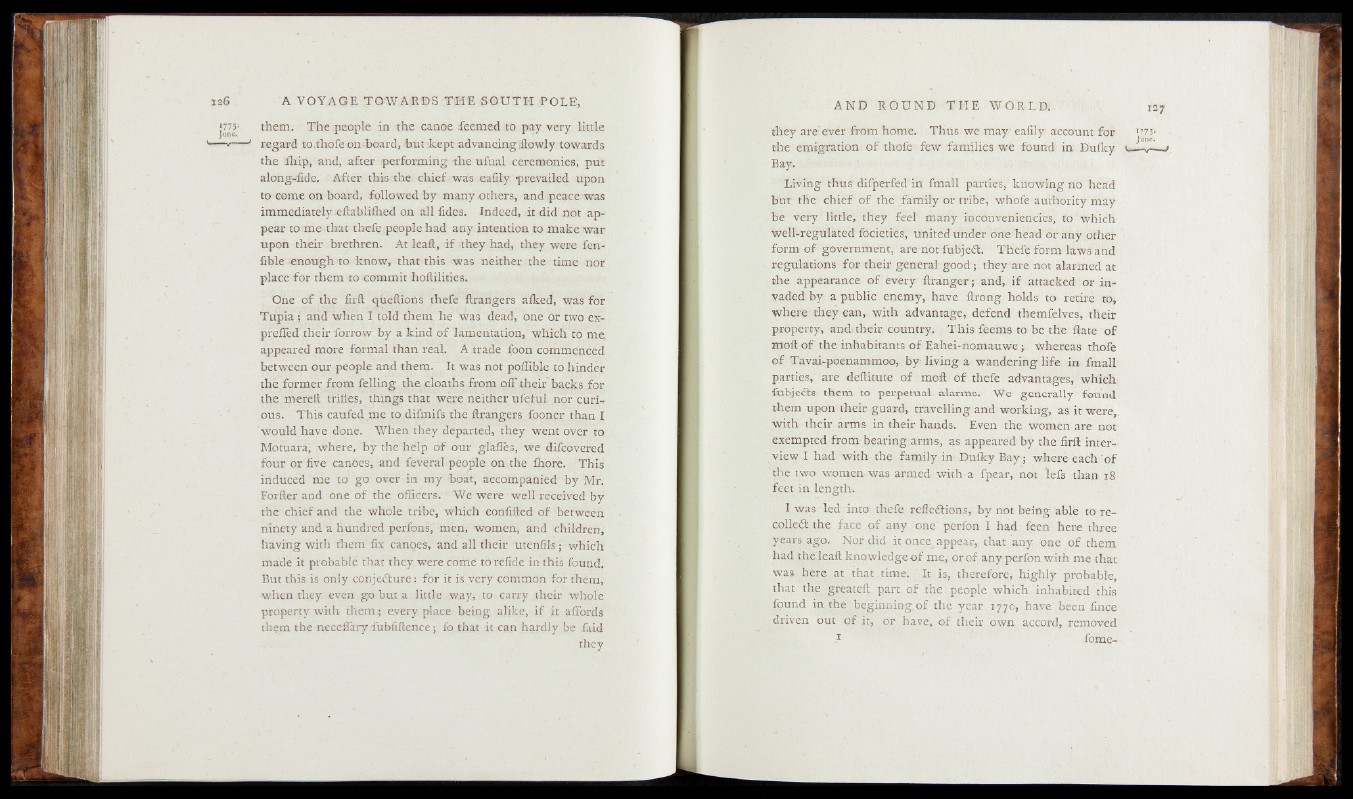
them. The people in the canoe feemed to pay very little
regard to,thofe on-board, hut-kept advancing ;flowly towards
the ihip, and, after performing the ufual ceremonies, put
along-fide. After this the chief was eafily prevailed upon
to come on board, followed by many others, and peace was
immediately .eftablifhed on all fides. Indeed, it did not appear
to me that thefe people had any intention to make war
upon their brethren. At leaft, if they had, they were fen-
fible enough to know, that this was neither the time nor
place for them to commit hoftilities.
One of the firft queftions thefe ftrangers afked, was for
Tupia ; and when I told them he was dead, one or two ex-
prefied their forrow by a kind of lamentation, which to me,
appeared more formal than real. A trade foon commenced
between our people and them. It was not poffible to hinder
the former from felling the cloaths from off their backs for
the mereft trifles, things that were neither ufeful nor curious.
This caufed me to difmifs the ftrangers fooner than I
would have done. When they departed, they went over to
Motuara, where, by the help of our glaffes, we difcovered
four or five canoes, and feveral people on the fhore. This
induced me to go over in my boat, accompanied by Mr.
Forfter and one of the officers. We were well received by
the chief and the whole tribe, which eonfifted of between
ninety and a hundred perfons, men, women, and children,
having with them fix canoes, and all their utenfils ; which
made it probable that they were come to refide in this found.
But this is only conjecture: for it is very common for them,
when they even go but a little way, to carry their whole
property with them; every place being alike, if it affords
them the neceflary fubfiftence; fo that it can hardly be faid
they are ever from home. Thus we may eafily account for 073-
J ' . . June;
the emigration o f thofe few families we found in Dufky <_,—
Bay.
Living thus difperfed in fmall parties, knowing no head
but the chief of the family or tribe, whofe authority may
be very little, they feel many ipconveniencies, to which
well-regulated focieties, united under one head or any other
form of government, are nor fubjeCt. Thefe form laws and
regulations for their general good; they are not alarmed at
the appearance of every ftranger; and, if attacked or invaded
by a public enemy, have ftrong holds to retire to,
where they can, with advantage, defend themfelves, their
property, and their country. This feems to be the ftate of
moft of the inhabitants of Eahei-nomauwe; Whereas thofe
of Tavai-poenammoo, by living a wandering life in fmall
parties, are deftitute of moft of thefe advantages, which
fubjects them to perpetual alarms. We generally found
them upon their guard, travelling and working, as it were,,
with their arms in their hands. Even the women are not
exempted from bearing arms, as appeared by the firft interview
I had with the family in DulkyBay; where each of
the two women was armed with a fpear, not lefs than 18
feet in length.
I was led into thefe reflections, by not being able to recollect
the face of any one perfon I had feen here three
years ago. Nor did it once_ appear, that any one of them
had the leaft knowledge of me, or of any perfon with me that
was here at that time. It is, therefore, highly probable,
that the greateft part of the people which inhabited this
found in the beginning, of the year 1770, have been fince
driven out of it, or have, of their own accord, removed
-1 fome